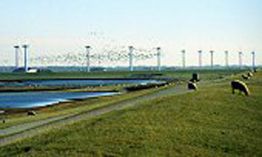Project Aim
The aim of the Wadden Sea Forum project (WSF) was to develop socio-economic perspectives for the Wadden Sea region. These perspectives were to be compatible with the national and international standards of nature and environmental protection of the Wadden Sea ecosystem and the protection of the landscape and cultural heritage of the Wadden Sea region, as laid down, in particular, in the joint trilateral Wadden Sea Plan, the Bird Directive, the Habitat Directive and the Water Framework Directive and in accordance with the vision, aims and strategies of NorVision.
Project implementation and results
The main achievement of the WSF project was a transnational and coordinated integrated coastal zone management (ICZM) strategy for sustainable development in the Wadden Sea Region, which contained a catalogue of policy recommendations.
Based on a common vision and containing the sectors fisheries, agriculture, industry/harbour, tourism and energy, the project has prepared sector-specific scenarios for sustainable development perspectives and, on the basis of these scenarios, elaborated sector specific strategies and project proposals.
Innovative solutions
The innovative scenario methodology helped overcome topical discrepancies and disagreements by focusing on the desired future situation of the region (a common Vision). The development of a common vision may be a great support for long-term spatial planning. In this respect also the use of computer-aided visualisation of the future situation in the region has been discussed and found broad support among the partners.
Joint transnational strategy
Mode of cooperation
The project was highly cross sectoral and many sectors were engaged in project activity including representatives from water, transport, energy, coats and sea, industry and agricultural sector. There was also good local, regional and national involvement. It should be noted that the involvement of local and regional citizens groups was higher than anticipated.
Impact of the project
Long-term achievements and policy shaping
An Action Plan containing 14 generic and sector-specific actions was agreed upon by WSF. The Action Plan will be implemented in the coming years by all partners involved, i.e. both governments and private organisations.
It is expected that the recommendations by WSF will influence future policies and legislation, in particular ICZM and spatial planning. An important element in these changes will be the involvement of stakeholders as a structural element of ICZM. |

Protection of the Wadden Sea ecosystem
Partners Ministry of the Environment, Agency of Spatial and Environmental Planning, DK
Inter-regional Wadden Sea Cooperation, DK
Federal Ministry for the Environment, Nature Protection and Nuclear Safety, DE
Ministry of Environmental Protection of Lower Saxony, DE
Regional Office of the Wadden Sea, National Park of Schleswig-Holstein, DE
Wadden Sea Team (WST), DE
Ministry for Agriculture, Nature and Fisheries, NL
Stichting van de Nederlandse Visserij, NL
Nederlands Oil and Gas Exploration and Production Association c/oNAM b.v., NL
Seas at Risk (SAR) c/o Waddenvereniging, NL
Noord Nederlandse Watersport Bond, NL
LP:
Common Wadden Sea Secretariat, CWSS
Project Manager
Jens Enemark
Common Wadden Sea Secretariat, CWSS Virchowstr. 1
D-26382 Wilhelmshaven
Germany
enemark@waddensea-secretariat.org
www.waddensea-forum.org
Tel: +49 4421 9108 12
Measure: 3.4
Start Date: 30 September 2002
End Date: 31 December 2005
ERDF Grant:
 1.034.941,00 1.034.941,00
Total Eligible Sum:
 2.069.882,00 2.069.882,00
|